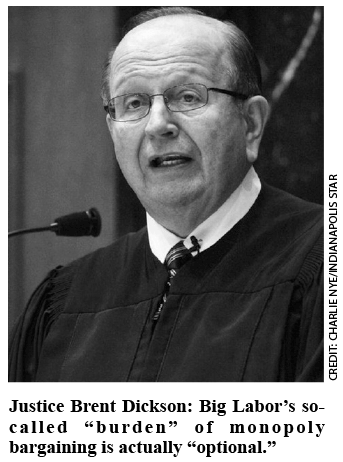Will Team Biden Weaponize Workers’ Pensions?
Big Labor abuse of worker pension and benefit funds as a means of advancing union bosses’ self-aggrandizing policy objectives is a familiar phenomenon.
State High Court Rejects Big Labor’s Top Excuse For Forced Dues
(Source: November-December 2014 National Right to Work Committee Newsletter)
Since Indiana adopted its Right to Work law in early 2012, top bosses of Chicago-based Local 150 of the International Union of Operating Engineers (IUOE) have been attempting to base a lawsuit to overturn the statute on an outrageous premise that contradicts decades of federal case law.
The premise is that the National Labor Relations Act (NLRA) prohibits employers from recognizing and bargaining with unions that represent their members only, and not workers who opt not to join and pay dues.
National Right to Work Committee Vice President Greg Mourad observed:
“The fact is, even if members-only bargaining were not permitted under federal labor law, IUOE Local 150’s claims that the Indiana Right to Work law violates the state constitution would still be false.”
Union Lawyer’s False Claim: ‘The Law Does Not Allow Members-Only Representation’
 “Justice Brent Dickson reached precisely this conclusion,” Mr. Mourad continued, “in his November 6 opinion for a unanimous Indiana Supreme Court rejecting IUOE Local 150 bosses’ suit and upholding the state Right to Work law.
“Justice Brent Dickson reached precisely this conclusion,” Mr. Mourad continued, “in his November 6 opinion for a unanimous Indiana Supreme Court rejecting IUOE Local 150 bosses’ suit and upholding the state Right to Work law.
“However, Americans who care about the truth and the integrity of our legal system should be pleased to know that, even though it wasn’t strictly necessary to do so, the opinion of the court directly rebutted IUOE kingpins’ ‘big lie’ regarding the permissibility of members-only bargaining.
“To be specific, Justice Dickson flat-out rejected the brazen contention of union lawyer Dale Pierson, made again and again at oral arguments on the case in September, that ‘the law does not allow members-only representation.’”
It Keeps Getting Harder For Forced-Dues Apologists To Evade the Truth
Justice Dickson and the three other justices who unequivocally agreed with his ruling (there was one separate concurring opinion) appeared to be puzzled by union lawyers’ stubborn clinging to a false contention that would not have won their case even if it were true.
But they remained firm in their insistence that the truth be acknowledged:
“The union’s federal obligation to represent all employees in a bargaining unit is optional; it occurs only when the union elects to be the exclusive bargaining agent, for which it is justly compensated by the right to bargain exclusively with the employer.”
The Indiana Supreme Court ruling in the IUOE Local 150 case, added Mr. Mourad, should make it even harder for forced-dues apologists to evade the truth about members-only bargaining.
“For decades,” he said, “union bosses’ favorite rationalization for forced union dues has been that their federal monopoly-bargaining privileges amount to a ‘burden’ for which they deserve compensation.
“But monopoly bargaining is actually a privilege avidly sought by Big Labor, and Indiana’s highest court has just officially recognized it as such.”
Steelworkers Union Petition Got It Right Back in 2007
Ironically, Mr. Mourad noted, lawyers for another union that has filed a still-pending suit to overturn Indiana’s Right to Work law admitted in a petition filed with the National Labor Relations Board just a few years ago what IUOE Local 150 kingpins have tried so hard to cover up:
“In 2007, United Steelworkers [USW] bosses affirmed without qualification that, under NLRA Section 7, in any workplace where no union is recognized as employees’ ‘exclusive’ bargaining agent, employees’ right to bargain with their employer through a union [on a members-only basis] remains ‘available and protected . . . .’
“As anyone who has a good understanding of federal labor statutes and court precedents knows, the union lawyers for the USW brass, along with the bosses of six other AFL-CIO-affiliated unions who signed on to the same petition, were totally correct about the permissibility of members-only bargaining in 2007.
“And they are still correct today.”

Big Labor abuse of worker pension and benefit funds as a means of advancing union bosses’ self-aggrandizing policy objectives is a familiar phenomenon.

Leaked CTU Proposals Won’t Do Anything to Improve Schools’ Poor Performance

What impact does handing a union monopoly power to deal with your employer on matters concerning your pay, benefits, and work rules have on your pay?